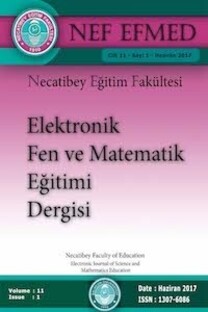Türkiye’de Wattpad Kullanımı Nedenleri
Wattpad, Wattpad kullanımı, çevrimiçi hikâye paylaşımı.
Reasons for Wattpad Use in Turkey
Wattpad, Wattpad usage, online story sharing,
___
- Aytan, T. (2017). Evaluation of electronic writing experiences of Turkish teacher candidates at Wattpad environment. Higher Education Studies, 7(4), 1-8. http://doi.org/10.5539/hes.v7n4p1
- Bal, M. (2018). Reading and writing experiences of middle school students in the digital age: Wattpad sample. International Journal of Education and Literacy Studies, 6(2), 89-100. http://dx.doi.org/10.7575/aiac.ijels.v.6n.2p.89
- Bonelli, R., Dew, R. E., Koenig, H. G., Rosmarin, D. H., & Vasegh, S. (2012). Religious and spiritual factors in depression: Review and integration of the research. Depression Research and Treatment, 2012. 1–8. https://doi.org/10.1155/2012/962860
- Borekci G. (2015, July). Wattpad writers a planet in its own: Interview with publisher Ozlem Esmergul. Retrieved July 20, 2018, from https://www.haberturk.com/yasam/haber/1107547-18-alti-wattpad-yazarlari-basli-basina-bir-gezegen
- Contreras, D. J. A. J., Gonzaga, H. G. N., Trovela, B. M. C., & Kagaoan, M. A. C. G. (2015). The “wattyfever”: Constructs of Wattpad readers on Wattpad’s role in their lives. LPU Laguna Journal of Arts and Sciences Communication Research, 2(1), 308–327. Retrieved June 26, 2019, from https://www.scribd.com/document/424289475/13-the-wattyfever-constructs-of-wattpad-readers-1-pdf
- Creswell, J. W., & Miller, D. L. (2000). Determining validity in qualitative inquiry. Theory into practice, 39(3), 124-130. https://doi.org/10.1207/s15430421tip3903_2
- Demir, N. Ö., Baran, A. G., & Ulusoy, D. (2005). Relations of adolescents with their peer groups-friends in Ankara and deviated behaviours. Journal of Social Sciences of the Turkic World, 32, 83-108. Retrieved June 26, 2019, from https://dergipark.org.tr/en/pub/bilig/issue/25372/267802
- Dogan, U., & Karakus, Y. (2016). Multi-Dimensional loneliness as the predictor of high school students' social network sites (SNS) Use. Sakarya University Journal of Education, 6(1), 57-71. http://dx.doi.org/10.19126/suje.40198
- Elitas, T., & Keskin, S. (2014). Mental diaspora in the context of virtual commitment: The example of Facebook. Journal of Ataturk Communication, 7, 161-186. Retrieved June 26, 2019, from https://dergipark.org.tr/tr/pub/atauniiletisim/issue/2766/372380
- Fruchter, M., 2010. Marketing on the social a few key ingredients. Retrieved July 18, 2019, from http://www.michaelfruchter.com/blog/2009/02/marketing-on-the-social-web-a-few-keyingredients
- Gozay, S. (2016) Interview with Meltem Erkmen, editor in chief of anatomy of the bestsellers. Retrieved June 26, 2019, from http://www.artfulliving.com.tr/edebiyat/cok-satanlarin-anatomisi-6-epsilon-yayinevi-i-6894
- Green Crescent. (2017) Green Crescent warns families against the hidden dangers of Wattpad. Retrieved June 15, 2020, from https://yesilay.org.tr/tr/haberler/yesilay-wattpadin-gizli-tehlikelerine-karsi-aileleri-uyariyor
- Kara, M. 2015. Turkey, the third market where 3 million users with Wattpad is the most popular. Retrieved Agust 28, 2019, from https://webrazzi.com/2015/11/12/turkiye-3-milyon-kullanicisiyla-wattpadin-en-populer-oldugu-ucuncu-pazar
- Kurt, D. G., & Yildiz, E. Ç. (2017). Kişilik kuramları: Gerçek yaşamdan kişilik analizi örnekleriyle [Personality theories: With real-life personality analysis examples]. Pegem Publishing
- Loh, C. E., Sun, B., & Lim, F. V. (2023). ‘Because I’m always moving’: a mobile ethnography study of adolescent girls’ everyday print and digital reading practices. Learning, Media and Technology, 48(4), 612-631. https://doi.org/10.1080/17439884.2023.2209325
- Miles, M. B., & Huberman, A. M. (1994). Qualitative data analysis: An expanded sourcebook. Sage Publications
- Parnell, C. (2021). Mapping the entertainment ecosystem of Wattpad: Platforms, publishing and adaptation. Convergence, 27(2), 524-538. https://doi.org/10.1177/1354856520970141
- Patton, M. Q. (2014). Qualitative research & evaluation methods: Integrating theory and practice. Sage Publications
- Pianzola, F., Rebora, S., & Lauer, G. (2020). Wattpad as a resource for literary studies. Quantitative and qualitative examples of the importance of digital social reading and readers’ comments in the margins. PLoS ONE, 15(1), 1–46. https://doi.org/10.1371/journal.pone.0226708
- Ramdarshan Bold, M. (2018). The return of the social author: Negotiating authority and influence on Wattpad. Convergence, 24(2), 117-136. https://doi.org/10.1177/1354856516654459
- Santa María, L., Aliagas, C., & Rutten, K. (2022). Youth’s literary socialisation practices online: A systematic review of research. Learning, Culture and Social Interaction, 34, 100628. https://doi.org/10.1016/j.lcsi.2022.100628
- Tokat, F. (2022). A Study on Turkish Books in Wattpad Platform using Tags and Popularity Rankings. International Journal of Education and Literacy Studies, 10(2), 81-91. https://doi.org/10.7575/aiac.ijels.v.10n.2p.81
- Ulu, M. (2018). On the relationship between the quest for meaning and personality traits. Bilimname, 36(2), 165-187. http://doi.org/10.28949/bilimname.459247
- Wattpad (2019). About Wattpad. Retrieved August 20, 2019, from https://www.wattpad.com/about
- Yin, R. K. (2009). Case study research: Design and methods. Sage Publications
- Young, R., Len-Ríos, M., & Young, H. (2017). Romantic motivations for social media use, social comparison, and online aggression among adolescents. Computers in Human Behavior, 75, 385-395. https://doi.org/10.1016/j.chb.2017.04.021
- ISSN: 1307-6086
- Yayın Aralığı: 2
- Başlangıç: 2007
- Yayıncı: Balıkesir Üniv. Necatibey Eğitim Fak.
İlkokul ve Ortaokul Matematik Ders Kitaplarının Kök Değerler Açısından İncelenmesi
Ramazan DİVRİK, Mustafa Zeki AYDOĞDU
Zeynep Büşra UZUN, Gülcan ÖZTÜRK
Okul Öncesi Öğretmenlerinin Matematik Yeterliğiyle İlgili Görüşlerinin İncelenmesi
İlkokul Öğrencilerinin Besin İçeriklerine İlişkin Bilişsel Yapıları: Kelime İlişkilendirme Testi
Matematik Öğretiminde Okul Dışı Öğrenme Ortamları Dersinin Öğretmen Adaylarının Düşüncelerine Etkisi
Türkiye’de Wattpad Kullanımı Nedenleri
Abdullah Ragıp ERSÖZ, Aysan ŞENTÜRK
Öğretimde Olumlu Söylem Ölçeği: Geçerlik ve Güvenirlik Çalışması
